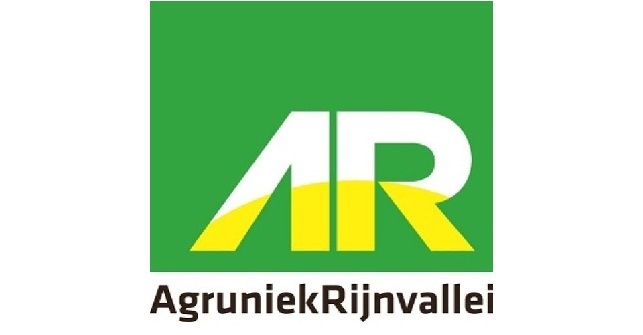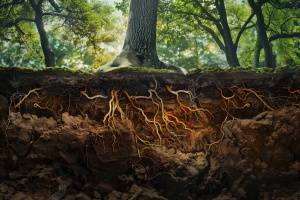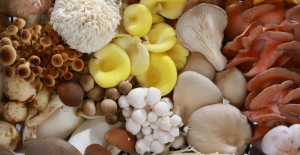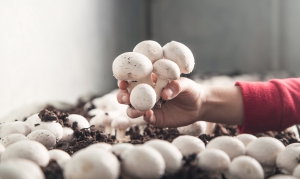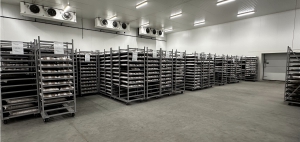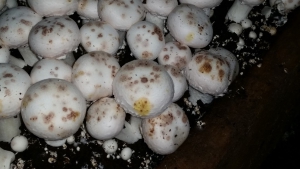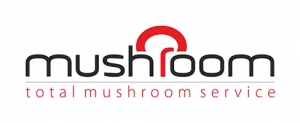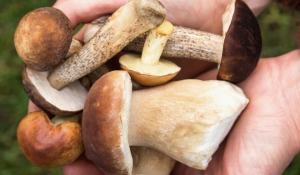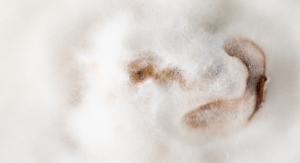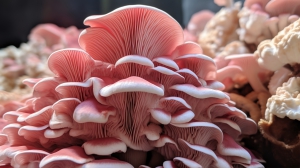If you remove the mushroom, nature falls apart
We often think of mushrooms as the visible fruit of a hidden world. A delicacy, a medicine, or simply a curiosity popping up after the rain. But beneath every mushroom lies an unseen network that is nothing less than the foundation of life on Earth. Remove the mushroom and nature, as we know it, begins to fall apart.
The hidden network beneath our feet
Every forest, meadow, and even your backyard soil hides a dense web of fungal threads called mycelium. This living network connects plants, trees, and microorganisms in an intricate underground communication system. It transports water, nutrients, and information, a kind of “wood wide web” that sustains entire ecosystems.
Without fungi, plants would struggle to grow. In fact, more than 90% of all plant species depend on a partnership with fungi known as mycorrhiza. These fungi attach to plant roots, exchanging minerals and moisture for sugars and carbon. It’s a perfect example of nature’s collaboration and without it, most forests would collapse.
The great recyclers
Fungi are the world’s ultimate recyclers. They decompose dead trees, fallen leaves, and animal remains, breaking down complex materials into nutrients that can be reused by other organisms. Without this process, forests would be buried under layers of organic waste, and the soil would become sterile.
In essence, fungi close the circle of life. When we remove them through soil degradation, chemical overuse, or deforestation, we break that natural recycling system. Nutrients stop flowing, and biodiversity declines.
An unsung climate ally
Fungi don’t just support plants — they also store massive amounts of carbon underground. Mycorrhizal fungi capture carbon from plant roots and lock it into the soil for decades or even centuries. Destroying fungal networks not only weakens plant life but also releases stored carbon back into the atmosphere, accelerating climate change.
The mushroom’s message
Mushrooms are the tip of a vast, intelligent system that has quietly sustained life for over a billion years. They are nature’s architects, caretakers and messengers, indicators of ecosystem health. When mushrooms disappear, it’s not just a culinary loss; it’s a warning sign that our environment is out of balance.
Protecting fungi means protecting life itself. Healthy soil, resilient forests, clean air, and even the food we eat all depend on the unseen world beneath our feet. So next time you see a mushroom in the wild, take a closer look. It’s not just a fungus, it’s a lifeline.
How do you see the role of fungi in the future of a healthier planet? We’d love to hear your thoughts, so drop us a line below!
The mushroom sector is entering a transformative phase, where farming tradition meets cutting-edge innovation. Once seen simply as a niche crop, mushrooms are now emerging as powerful contributors to sustainable agriculture, human wellness, and even material science.
Shaping a circular food system
One of mushrooms’ greatest strengths lies in their resource efficiency. Unlike many crops, they flourish on byproducts such as straw, sawdust, or coffee grounds, making them natural allies in the shift toward circular farming. For growers, this opens opportunities to reduce waste, diversify substrates, and partner with other agricultural industries to create closed-loop systems.
Health on the rise
Consumer interest in functional and nutrient-rich foods continues to surge, and mushrooms are at the forefront. Varieties like Lion’s Mane and Reishi are valued for their adaptogenic potential, while everyday favorites such as oyster and button mushrooms are being recognized for their protein, fiber, and vitamin D. This dual reputation, both as staple food and functional ingredient, is fueling new product development across the food and supplement industries.
Farming smarter with technology
The drive toward efficiency and scalability has accelerated adoption of digital tools. Automated climate systems, AI-based monitoring, and sensor-driven data analytics are helping growers fine-tune production while tackling labor shortages. Farms that embrace these technologies are finding new ways to improve yields, cut costs, and meet rising demand with consistency.
Beyond the plate
Mushrooms are increasingly breaking into non-food markets. Mycelium, the root-like structure of fungi, is now being used to create biodegradable packaging, sustainable textiles, and even construction materials. These developments highlight the mushroom industry’s potential to play a role far beyond food, positioning it as a cornerstone of sustainable innovation.
Building a future-ready industry
As mushrooms gain attention worldwide, the industry faces both opportunity and responsibility. Growth must balance innovation with sustainability, ensuring practices that protect natural resources while meeting expanding consumer expectations. Collaboration between farmers, researchers, and entrepreneurs will be vital in keeping the sector resilient.
Mushrooms today are not only a crop but a vision of what agriculture and innovation can achieve together. For farmers and industry leaders, the message is clear: cultivating mushrooms means cultivating the future.
In the following weeks we'll dive deeper into theses subjects. Do you have expertise, research or success stories on these subjects that can inspire others? Reach out and let’s share your voice with our readers!
Published by Mushroom Matter: connecting the global mushroom community through insight, innovation, and inspiration
Compost-casing-mushroom water relationships
The function of casing is to induce fruiting, support mushroom growth, and provide a source of water to the mushroom that compensates for its water lost through evaporation and transpiration. Sometimes, there has been an overemphasis on the influence of the moisture layer in the casing on mushroom yield and quality. A large variation in the compost substrate moisture may have more influence on mushroom yield and fresh mushroom quality. It is not to say that casing moisture does not influence yield or quality, but it may take a larger disparity in moisture to markedly influence the end product.
The mushroom relies on water potential gradients to move water through the mycelium. Water flows from regions of higher water potential to lower water potential, which helps maintain turgor pressure necessary for mycelial tip extension and growth. This same gradient also affects nutrient transport: nutrients, ions, and metabolites often move along with water via bulk flow or are actively transported across membranes, but their distribution is shaped by the underlying water potential differences within the mycelial network and between the fungus and the compost.
In a mycelial network, water potential gradients help the translocation of nutrients—moving them from the compost, the resource-rich region, to actively growing hyphal tips or fruiting bodies. Under dry conditions, the external water potential becomes too low, water movement into the hyphae slows, reducing nutrient uptake and impairing growth. Conversely, favorable water potential promotes efficient uptake and redistribution of resources throughout the mycelium.
Think of thicker rhizomorphs in the casing as the big pipes that move water and nutrients from the compost to the developing mushrooms. To keep mushrooms healthy and productive, this pipe system needs to stay in good working order all through the crop. Just like it’s easier to move water through a fire hose than a garden hose, well-developed rhizomorphs make water delivery more efficient. Keeping the casing wet or moist is what allows these larger “pipes” to form and continue feeding the mushrooms. If the casing dries out during production, most strains will give lower yields and poorer quality mushrooms. In the end, this whole water network relies on the compost as the main source of water for the crop.
Water is constantly moving during the cropping cycle. Mushrooms take up water into their cells, while water is also lost through evaporation and transpiration. Growers replace this loss mainly by watering the casing layer. However, we still know little about exactly how mushroom mycelium absorbs and transports water, or how water moves through rhizomorphs into the mushroom itself.
Some research suggests that water uptake depends on differences in water potential between the mycelium and the compost solution (Kalberer, 1987). As cropping progresses, mushrooms use water from both the compost and casing, while evaporation, transpiration, and respiration continually reduce the water content of the crop. This loss lowers the water potential inside mushroom cells. Because water moves from higher to lower potential, this gradient may allow mushrooms to absorb water with little energy cost. Another idea is that nutrient absorption helps drive water uptake (Holtz, 1971; 1979; Schroeder & Schisler, 1981; Kalberer, 1987). When nutrients are actively absorbed by the mycelium, the osmotic potential inside the cells decreases. Water then follows passively, moving in response to the concentration of nutrients. The developing mushrooms produce the sugar mannitol and therefore have a much higher concentration than the vegetative mycelium (Holtz, 1976). It was suggested that this different concentration of mannitol creates the osmotic and water potential gradient responsible for “pumping” nutrients and water from the compost mycelium through the casing rhizomorphs and into the developing mushrooms.
In summary, mushroom fruit body development depends on a balance of water movement between the compost, casing, and the developing fruit mushrooms. While casing moisture is important for yield and quality, compost moisture may play an even greater role. Water and nutrients move through the mycelium by water potential gradients, flowing from wetter regions in the compost toward drier hyphal tips and mushrooms. Rhizomorphs act like large pipes, efficiently transporting water and nutrients when casing moisture is maintained; if the casing dries, yields and quality decline. Water uptake is largely passive, driven by gradients in water and osmotic potential, which are influenced by nutrient absorption and the accumulation of compounds like mannitol in mushrooms. Together, these processes form a dynamic water transport system that sustains mushroom development throughout cropping.
REFERENCES
Holtz, R.B. 1971. Qualitative and quantitative analysis of free neutral carbohydrates in mushroom tissue by gas-liquid chromatography and mass spectrometry. J. Agr. Food Chem. 19 (6):1272-1273.
Holtz, R.B. and Smith, D.E. 1979. Lipid metabolism of mushroom mycelia. Mushroom Sci. 10 (Part 1):437-444.
Kalberer, P.P., 1987. Water potentials of casing and substrate and osmotic potentials of fruit bodies of Agaricus bisporus. Sci. Hort. 32:175-182.
Schroeder, G.M. and Schisler, L.C. 1981. Influence of compost and casing moisture on size, yield, and dry weight of mushrooms. Mushroom Sci. 11:495-509.
A few years ago, we visited the spawn facility in Venlo - back then still operating under the name Lambert Spawn. Much has changed since. Time for a renewed introduction. We spoke with Ies Hooglugt, site manager of the Venlo location, about technology, collaboration and Ecovative’s ambitions.
The moment you walk into Ecovative’s production site in Venlo, it’s clear: serious work is being done here to produce top-quality spawn. Since the American company Ecovative took over around 2.5 years ago, a lot has changed and improved.
“We’ve truly matured as an organization,” says Ies Hooglugt. “The technology, the processes, and the people have all grown significantly.”
Spawn as core business
The Venlo factory is a well-known name in the spawn industry, formerly operating under the Lambert Spawn brand. Today, about 90% of production is focused on mushroom spawn and 10% on so-called “non-mushroom” applications, such as leather alternatives and mycelium-based packaging.
“That market is still in development. Promising, but young,” says Hooglugt. “Our core business remains the production of mushroom spawn.”
Within that 90%, the split is approximately 80% Agaricus and 20% exotics. “A valuable addition. We see great potential there, and the results are promising.”
From grain to custom solutions
One of Ecovative Venlo’s distinguishing features lies in the substrate used for growing spawn. While many suppliers use standard grain and straw, Venlo decided to look further.
“We used to work exclusively with millet, but that’s not suitable for every mushroom species,” explains Hooglugt. In collaboration with Belgian partner Mycelia - known for its extensive knowledge of exotics - new carriers were developed: Blend and Speed Spawn.
“We tailor the substrate to the mushroom, not the other way around. This results in faster and more efficient colonization of the substrate.”
Strategic partnership with Mycelia
The collaboration with Mycelia is strategic and goes far beyond just substrate or inoculum.
“For exotics, we work together at the highest level,” Hooglugt explains. “Mycelia brings decades of experience and deep knowledge of exotic species, and we contribute our production expertise. It’s a close collaboration - from strain selection to final spawn production.
For Agaricus, we now produce our own inoculum in-house, but for exotics we consciously build on Mycelia’s strength.”
According to Hooglugt, the triangle is solid: the American parent company provides scientific power, Mycelia brings practical expertise, and Venlo contributes production knowledge.
“All of these elements complement each other perfectly.”
Quality first
The acquisition by Ecovative has raised the bar. Internal processes have been tightened, and quality systems optimized.
“The advanced and unique system we use to make spawn is fairly complex. It requires well-trained people,” says Hooglugt. “Fortunately, we have a strong and stable team here, with hardly any turnover. That’s quite exceptional in this sector.”
He likes to compare it to Formula 1: “You can have the best car, but without a skilled driver, you won’t win the race. And vice versa. Here, everything lines up — people, technology and processes.”
Testing and research
Ecovative leaves nothing to chance, as shown by its close cooperation with research institutes. Spawn is tested at Inagro in Belgium, and the company works with Wageningen University & Research (WUR).
“WUR recently developed 16 sporeless oyster mushroom strains,” says Hooglugt. “These are freely available to the market, with the exception of the Purati, which is an exclusive release by Mycelia. And we’re producing the spawn.”
Growth ambitions
Although exports are going well, there’s still room to grow in the Dutch market.
“We’d like to expand domestically,” says Hooglugt. At the same time, he sees the market evolving. “There’s consolidation happening, growers are scaling up, and so are suppliers. That’s exactly why having alternatives is becoming more important.
We notice growers are making more conscious decisions.”
A great example is an Italian Pholiota grower who felt too dependent on his regular supplier.
“He actively sought a solid alternative, and we succeeded together,” Hooglugt shares. “We developed a new solution collaboratively. That’s what we stand for: flexibility, customisation and quality. It gives growers more control over their own process.”
After our visit to Venlo, one thing is clear. Ecovative stands strong, both literally and figuratively. The team knows what it stands for, operations are tightly managed, and the vision is clear. Most of all, the door is open for growers who want to move forward.
Team Mushroom Matter
Virus and bacterial diseases
LaFrance virus disease
Of all the diseases confronting mushroom growers, none have been the subject of more confusion than viral diseases. Viral diseases can be confused with the effect of poor cultural practices or the bacterial disease mummy. Since no known commercial mushroom strain is resistant to viruses, growers must incorporate preventive measures into the IPM plan and rigorously carry out control measures.
The virus lives in mushroom spores and mycelium (spawn). Infected spores spread the disease to other new crops. Infected mycelium (spawn) may survive in the bed boards or quickly spread in bulk phase III facilities. Spores survive many years and can be released during farm renovations.
Symptoms (Figure 1-4):
- Portabellas don’t size up; lower yield, Fig 1.
- Bare areas with few pins and mushrooms, Fig 2.
- Premature opening of the veil (small caps)
- Mild yield loss
Severe infection:
- “Drumstick” (small caps, long stems) Fig 3.
- Weak growth in the casing that often disappears over time
- Die-back of mycelium in the compost, Fig 4.
- Stems discolor quickly when cut
- Significant yield loss
Control:
- Exclude, eradicate, or reduce inoculum.
- Mushroom spores at spawning
- Mushrooms should be harvested before they mature and the caps open, releasing spores.
- Infected mycelium at spawning or casing
- Isolate the crop.
- Regularly scheduled replacement of filters/filtration
- Air movement—high positive pressure in spawning and casing areas
- Practice postharvest steaming to eliminate pathogens and mushroom mycelium/spores between crops.
- Virus-infected mycelium in the wooden tray/bed boards
- Virus-infected mushrooms and spores left on the bed
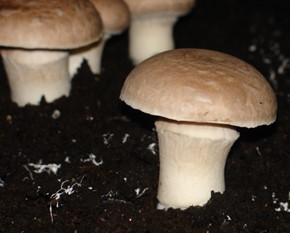 figure 1 |
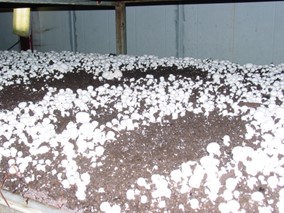 figure 2 |
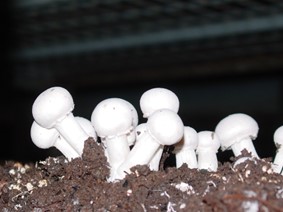 figure 3 |
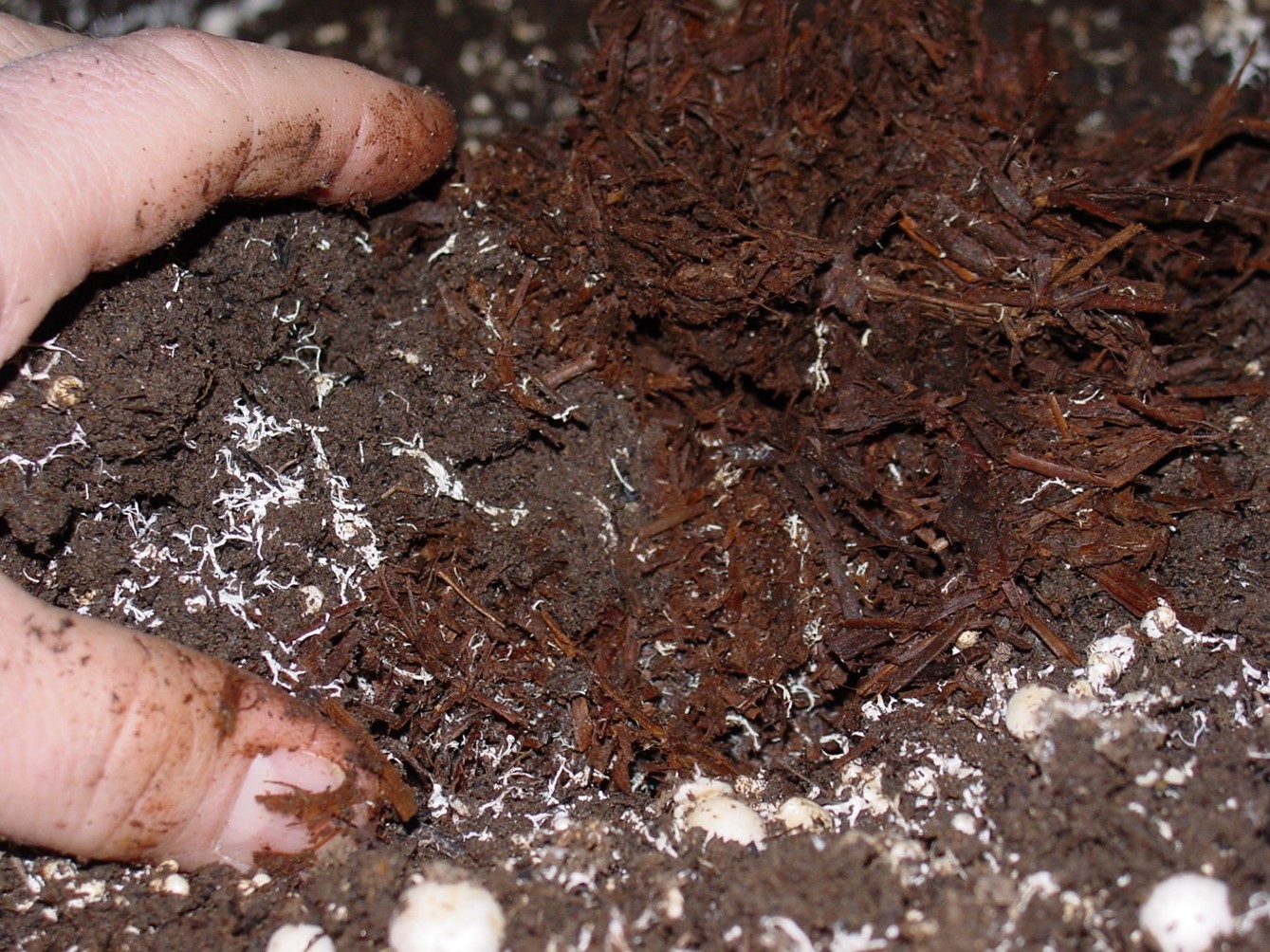 figure 4 |
Bacterial diseases
1) Bacterial Blotch
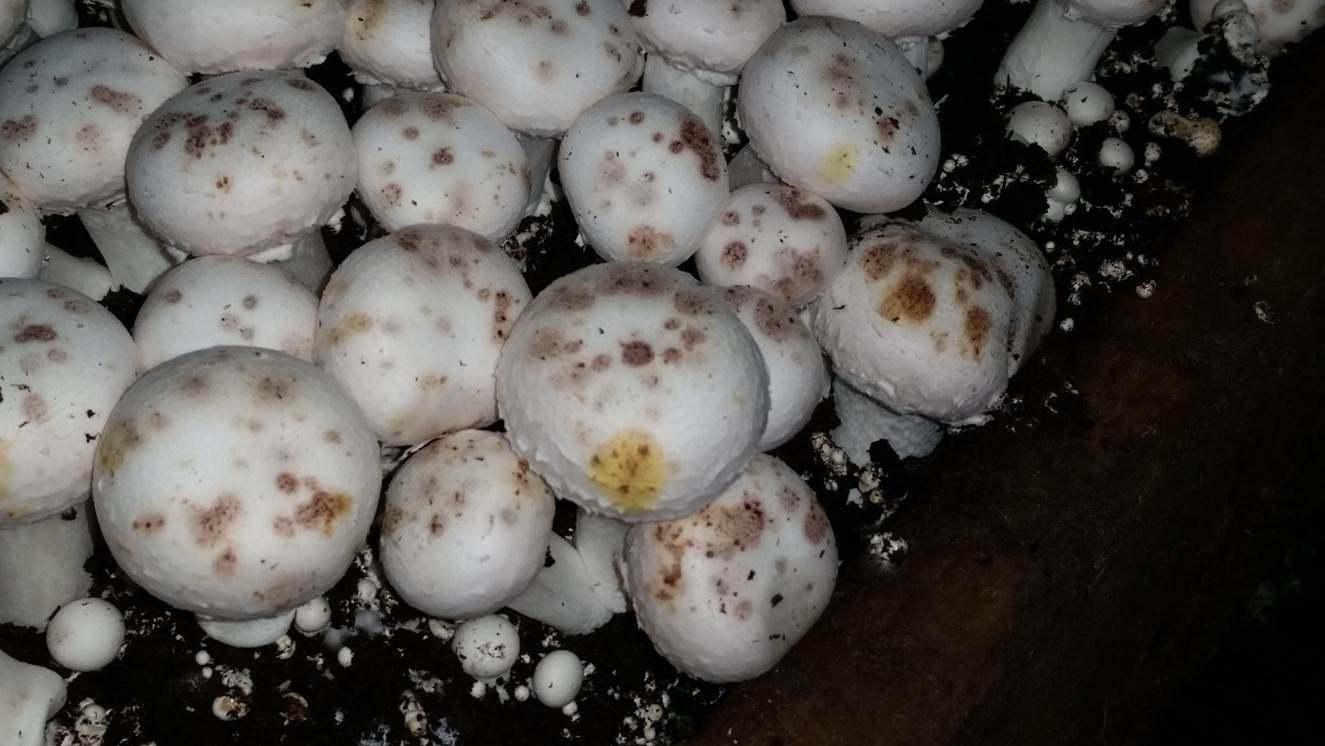
Signs and Symptoms:
- Superficial discoloration which leads to lower quality in the marketplace
- First pale yellow, then darkens to golden yellow to brown color.
- Bacterial pathogen: Pseudomonas tolaasii, recently other species have been found to cause similar symptoms
2) Mummy Disease
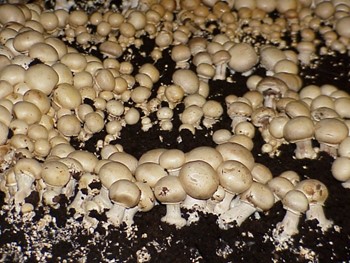
Signs and Symptoms:
- Stunted growth, swollen base
- Sometimes mushrooms develop curved stipe with translucent, longitudinal streaks on the side
- Tissue appearance: spongy, dry and leathery
- First break can be harvested; second break mushroom does not grow in the affected area
- Scientific name: Pseudomonas species
By David M. Beyer, Penn State University
Mycelium growth in casing soil (back to basics)
We are observing that the amount of mycelium in the casing soil often leaves much to be desired. Ideally, thick mycelium strands should grow from the bottom to the top of the casing soil, while leaving enough casing soil not yet overgrown with mycelium. This remaining casing soil serves as a water buffer for the compost and mushrooms.
It's crucial to remember that this water buffer also determines how long and how much you can evaporate in the growing room before the casing soil dries out. If the casing soil dries out, you will need to water, even if it's not ideal for the mushroom quality. Therefore, it is important to pay close attention to the mycelium growth in the casing soil.
If there is structurally too much mycelium in the casing soil, a few adjustments can improve the situation. One option is to start ventilating earlier, although this means the mycelium may not reach the surface as much as usual. You can also adjust the watering schedule.
Once the mycelium starts growing from the top layer of compost and the casing material, it is essential to keep the casing soil well-moisturized. Each watering essentially stops the mycelium; weak mycelium struggles with this and can barely continue developing, whereas strong mycelium has fewer issues and continues to grow. In this way, you encourage more strong mycelium and reduce the amount of mycelium in the casing soil.
Our mushroom strains tend to form pins quite spontaneously, so many growers are ventilating extremely slowly. While this isn't necessarily a problem, it's important to realize that as long as the compost temperature is above 23°C, the mycelium will keep growing in the casing soil. Therefore, you should start ventilating earlier or increase circulation to bring the compost temperature below 23°C quickly. Once the compost temperature reaches 23°C, you can reduce circulation and control the number of pins by adjusting the air temperature.
I believe that with this method, you can control the amount of mycelium to some extent without leading to too many pins or a lack of distribution in the first flush. You might also consider using slightly heavier casing soil.
Slightly drier casing soil offers more certainty in terms of mycelium growth. Also, pay attention to covering. Avoid running the pinning axis and leveler too quickly to prevent structural damage. The mixing of the casing should be adequate, but more speed is unnecessary for the pinning axis.
Written by: Jeroen van Lier | Total Mushroom Service
An inside look at Christiaens Group in Horst
Recently we, Mushroom Matter, had the pleasure of visiting Christiaens Group in Horst in the Netherlands. During the visit, we were given a tour by Roland van Doremaele, the sales manager who has been with the company for 21 years. What stood out immediately was the strong focus on craftsmanship and the down-to-earth Dutch mentality that characterizes this family business.
A family business with a rich history
Christiaens Group started to make machineries early 70’s, starting as a modest company rooted in strawberry and asparagus farming. The business initially grew around a simple machine for washing, trimming, and manually sorting asparagus. This machine laid the foundation for what would later grow into a global leader in the mushroom and compost industry.
The Christiaens brothers, with their technical expertise and innovative spirit propelled the company forward, especially when they ventured into the mushroom world by developing a filling machine for a mushroom farmer in closeby. With each growing demand for their machines, their reputation further strengthened, leading to exports and collaborations with various suppliers in construction and climate control. This helped Christiaens Group develop a broad expertise, enabling them to realize complete projects.
Growth and development
In the mid-1990s, Christiaens Group B.V. was officially established, with a clear focus on delivering turnkey projects for the mushroom sector.
Initially, the company had operations spread across four locations in Limburg. However, in 2003, they consolidated all activities into a single site in Horst, improving efficiency and collaboration.
An important aspect of their expansion was the creation of separate business units. The Agro division was fully spun off and now operates independently under the name Christiaens Agro Systems. Additionally, other branches within the group specialize in organic solids composting, mycelium cultivation and animal manure, demonstrating the company’s diverse expertise beyond just mushrooms.
Today, Christiaens Group employs around 110 people, with approximately another 150 people working through subcontractors. The headquarters is based in Horst and Christiaens Group has since about 10 years also a production location in China.
Comprehensive solutions and product offerings
Christiaens Group has become a global leader by offering complete turnkey solutions for mushroom farms, composting facilities and mycelium farms. Their services cover every aspect of the process, ensuring that clients receive a fully integrated solution, from design to implementation.
“What makes Christiaens Group truly unique is that all our solutions are designed and produced entirely in-house. This level of control allows us to ensure the highest quality from start to finish. While we’re known for handling large-scale projects, we’re also fully equipped to take on smaller projects and provide by example individual machines, hydraulic lorries or airhandling systems, making our expertise accessible to a wide range of clients.” — says Roland.
Their key solutions include:
- Engineering: The setup and engineering of complete projects in the mushroom and waste industries.
- Construction: Expertise in constructing mushroom farms and composting plants, ensuring durability and efficiency.
- Technical Installation: Installation of air handling systems, technical installations for climate control, and odor management solutions.
- Controls: Advanced control technology for managing all processes in mushroom cultivation and compost production.
- Machines: Design and production of high-quality machinery for compost production and mushroom cultivation
Christiaens Group's product portfolio includes:
- Composting systems:
- Phase 1 bunkers
- Phase 1 tunnels
- Phase 2/3 tunnels
- Growing Systems:
- Dutch shelving system
- Tilting system
- Drawer system
- Organic Waste Composting:
- Composting systems
- Odour management technologies
•
- Mycelium Cultivation:
- Mycelium growing systems
- Substrate preparation
- Product handling systems
Innovation and sustainability as core values
Innovation and sustainability are key at Christiaens Group. They understand that it is important to produce high-quality mushrooms and compost while using as few natural resources as possible. Therefore, they continuously work on new concepts that improve harvesting efficiency, energy efficiency, and safety.
A good example of their commitment to sustainability is the investment in 20,000 m2 solar panels on their premises, allowing them to operate completely energy neutral and with use of heatpumps without gas for heating the building. This not only contributes to lower energy costs but also to a cleaner environment.
Christiaens Group is focused on technological innovation in mushroom harvesting. Due to global labor shortages, they have partnered with a specialist in robotics, to develop an advanced robotic solution for harvesting mushrooms in their Drawer System. This collaboration came about with great interest during the Dutch Mushroom Days in spring 2023, the largest event in the mushroom sector.
Christiaens Group collaborated with Heereco, a pioneer in organic mushroom cultivation in the Netherlands, to implement one of the first fully automated solutions for mushroom harvesting in the fresh market. This system integrates Christiaens' future-proof Drawer System with an advanced robotic technology. The result is a revolutionary automated harvesting process that significantly increases productivity and reduces labor dependency while enhancing the quality of the mushrooms. The system also includes advanced automation in the packaging process, ensuring consistency and efficiency from harvest to shipment.
Mycelium products
Christiaens Group is also the technical partner of Mycelium Materials Europe (MME), a Dutch start-up founded in 2018. MME is active in the bio-based materials and circular economy, producing sustainable mycelium materials based on mushroom technology. Mycelium, the underground network of fungi, is grown in MME’s own mushroom farm using organic waste such as sawdust from sawmills. These mycelium materials are biodegradable and are used by designers, the construction industry, and the fashion industry.
Christiaens Group’s partnership with MME highlights their commitment to sustainability and innovation, extending their expertise beyond traditional mushroom and compost production into emerging sectors focused on eco-friendly materials.
A Company with a future
During our visit to Christiaens Group, it quickly became clear that this is more than just a business—it’s a family rooted in tradition, with a constant eye on the future. The company’s long-term success is built on ongoing investments in innovation, sustainability, and global growth. This approach allows them to maintain their leadership in the mushroom, compost and mycelium industry while staying grounded in the values that have defined them for decades.
"Many of our team members have been with us for decades—it’s not uncommon to celebrate work anniversaries of over 25 years.” says Roland van Doremaele. "It’s this passion, combined with the company’s welcoming culture, that creates such strong employee loyalty. “
With a down-to-earth attitude, a commitment to quality, and a focus on both people and progress, Christiaens Group is more than prepared to take on the challenges of the future.
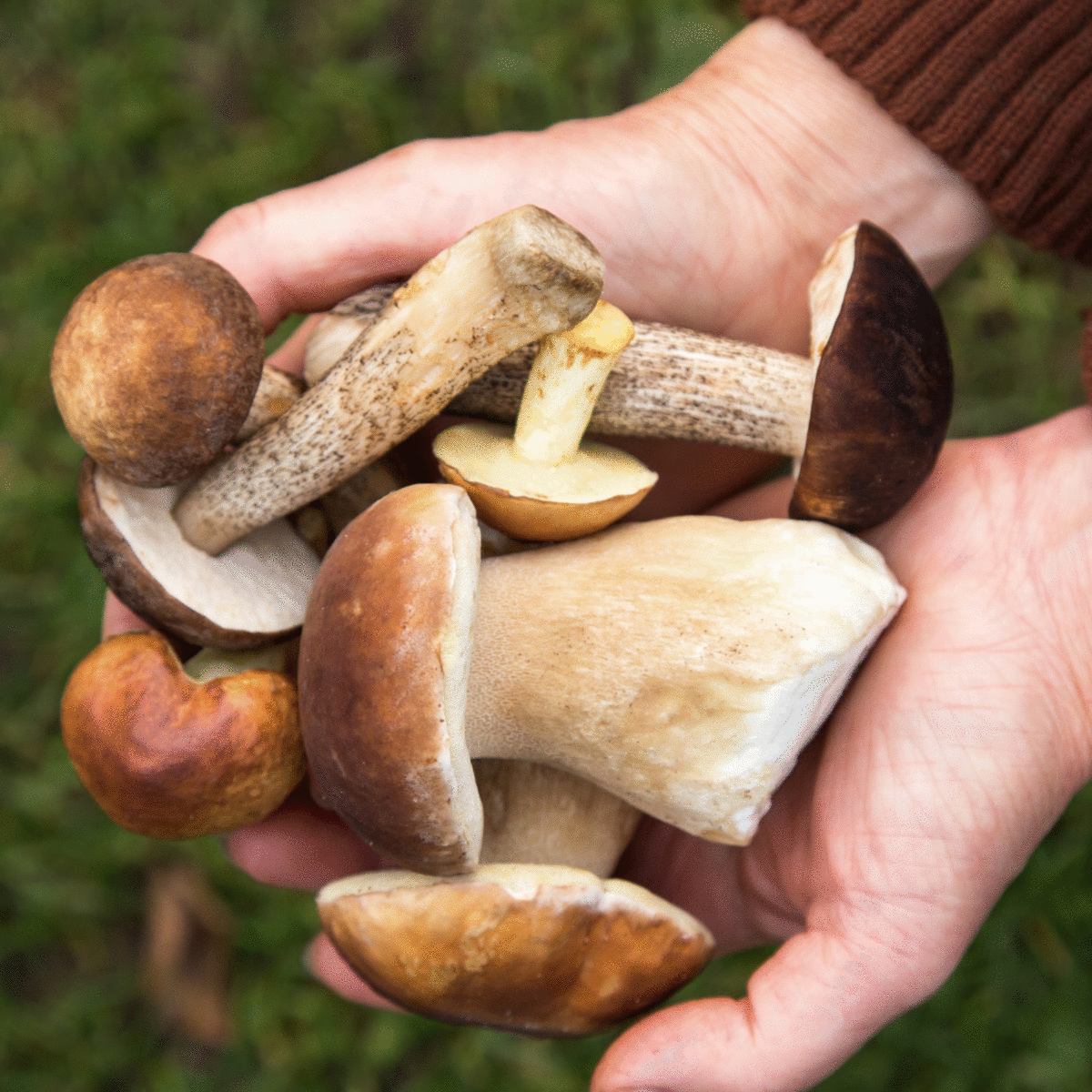 When you hear the word "mushroom," what comes to mind? Do you simply picture the small fungi you pass by during a hike, barely noticing them as you walk through the woods. Or do you think of the rich, savory flavors they bring to your favorite dishes? Whatever your association, September - the National Mushroom Month - is the perfect time to discover just how remarkable mushrooms truly are.
When you hear the word "mushroom," what comes to mind? Do you simply picture the small fungi you pass by during a hike, barely noticing them as you walk through the woods. Or do you think of the rich, savory flavors they bring to your favorite dishes? Whatever your association, September - the National Mushroom Month - is the perfect time to discover just how remarkable mushrooms truly are.
Despite their simplicity, mushrooms are incredibly versatile. They add a rich umami flavor to dishes, stretch your grocery budget by enhancing meals and offer solutions to some of today's biggest challenges. In a world where sustainability and health are increasingly important, mushrooms stand out as a natural answer. Mushrooms have a unique ability to clean up environmental pollutants, including the ability to absorb radiation from contaminated soil.
They are also vigorous of nutrients, notably rich in Vitamin D, essential for calcium absorption and bone health. Beyond their nutritional value, mushrooms possess a variety of medicinal properties. Some species are known for their vibrant, natural dyes, while others have been recognized for their potential anti-cancer benefits.
As we celebrate National Mushroom Month, we encourage you to explore and share the wonders of these humble fungi with your network. Whether you're discussing their #culinairuses, #healthbenefits, or #environmentalimpact, there's no shortage of fascinating facts to spread!
Building homes from mushroom waste and weeds
A groundbreaking project in Namibia is turning mushrooms and invasive plants into eco-friendly homes. The MycoHab initiative uses mycelium, the root structure of fungi, to create sustainable building materials. The process involves growing edible mushrooms on substrates made from the invasive encroacher bush. After the mushrooms are harvested, the remaining material is compacted into strong, lightweight, and biodegradable bricks. These “mycoblocks” offer a sustainable alternative to concrete while also helping tackle Namibia’s housing crisis.
In early 2024, MycoHab unveiled its first house made entirely from these bricks. The project, supported by institutions like MIT and local partners, aims to provide affordable, carbon-negative homes that require less energy and labor to build. Additionally, the initiative offers social benefits, such as job creation in mushroom farming and material production. This approach is being hailed as a model for sustainable construction that can be scaled up globally.
Mycelium-based materials not only reduce carbon emissions but also offer excellent insulation, fire resistance, and design flexibility. While still in its early stages, this innovative method shows promise as a key solution for eco-friendly housing in Namibia and beyond.
Source: The Guardian via https://www.theguardian.com/environment/article/2024/jul/18/namibia-homes-built-from-mushrooms-mycohab-mycelium
Of course we know what mushrooms can do!
To be sure you know as well, we have written a summary of below video from National Geographic:
Communication Networks: Mushrooms form vast underground networks (mycelium) that allow trees and plants to communicate and share nutrients.
Environmental Impact: Mushrooms can break down pollutants and toxins in the environment, aiding in bioremediation.
Medical Uses: Compounds in mushrooms have potential health benefits, including anti-cancer properties and supporting mentalhealth through substances like psilocybin.
Nutritional Benefits: Mushrooms are rich in vitamins, minerals, and antioxidants, contributing significantly to human health.
Building Materials: Mycelium can be used to create sustainable, biodegradable building materials like bricks and insulation, which are strong, fire-resistant, and eco-friendly.
Source: National Geographic




